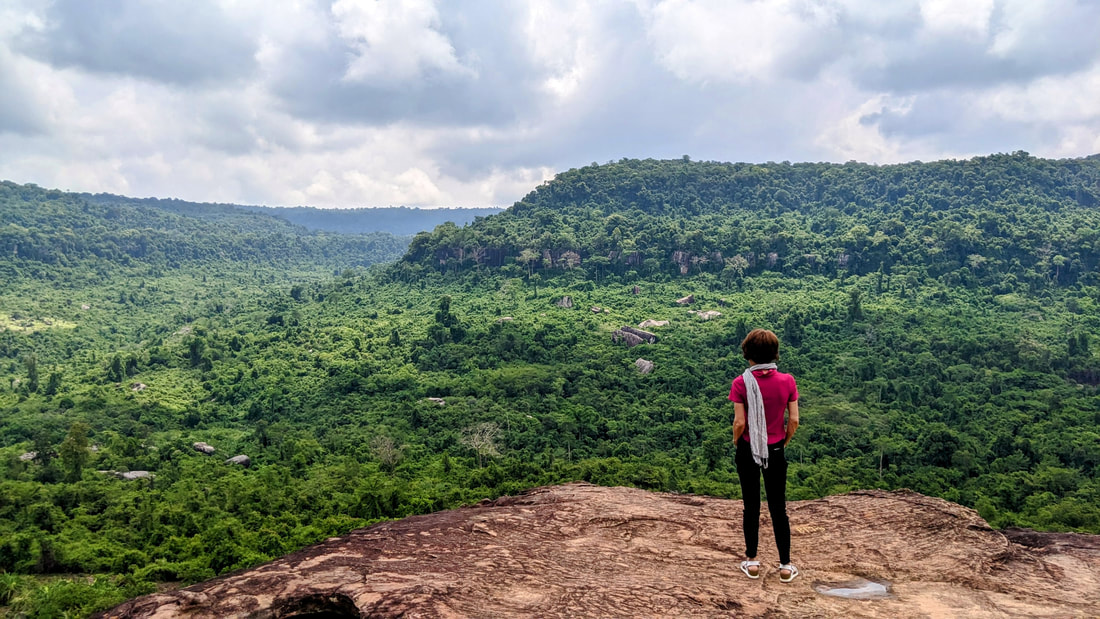Opening new opportunities for ecotourism in Cambodia through trail development and restoration4/5/2023 Sustainable Ecotourism in Cambodia Takes a Big Step Forward with International-Standard Trail Development and Trail Restoration  Key trails on the holy mountain of Phnom Kulen are undergoing redevelopment and restoration for nature lovers to explore in the coming months. These routes are the first in a series of sustainable trails that will be developed in Cambodia, designed and built to international best-practice standards. These new trail corridors are designed to provide visitor-friendly information and safety tips, provide an enriched trail experience and be accessible year-round in the face of weather-related environmental conditions. Two international experts are in-country to assist with the training and planning of the trails, including Mr. Galeo Saintz, previously Founding Chair of the World Trails Network, and experienced US-based trail builder and educator Mr. Kevin Simpson. Together, they have provided guidance and best-practice learning for the Cambodian trail builders in a customized training course in Siem Reap and Phnom Kulen. Designed from a trail user’s perspective, the trails will offer a range of facilities for visitors including a standard trailhead, information centers, rest areas and viewpoints along the routes. These trails will be designed and built by certified Cambodian trail builders and trail auditors responsible for carrying forward the mission of Cambodia’s trails. Due for publication in the coming months, the ‘National Trails Guidelines for Cambodia’ will steer the entire process and help to set the standard. The trail management development is aligned to the World Trails Network’s Green Flag Trails certification process and Cambodia plans to become the first country in Southeast Asia to offer Green Flag Trails certified trails. The current trails on Phnom Kulen feature a mix of culture and nature experiences, passing through some of the majestic waterfalls and ancient archaeological sites of the sacred mountain. Routes will include gentle looping trails around key attractions such as the River of a Thousand Lingas and the Reclining Buddha, as well as a realigned Waterfall Trail and the Hidden Boulders Trail. There will be the opportunity for overnight camping at community-based ecotourism (CBET) campsites at strategic points along the way. The development of world-class trails in Cambodia as a key element in the ecotourism offer also marks a new journey for repositioning and diversifying Cambodia’s current tourism offering towards outdoor, nature-based experiences. Cambodia has long relied on the Temples of Angkor to draw international visitors, but as back-to-nature experiences took off during the pandemic, it is time to show another side of the Kingdom. In the domestic market, ecotourism activities such as trekking and cycling boomed during the pandemic, ensuring that Cambodia is in a strong position to benefit from both an international and domestic ecotourism market moving forward. For international visitors, ecotourism activities ensure a longer stay in Cambodia and help position the country as a standalone destination for a longer trip and not just as an extension destination to neighboring Vietnam and Thailand. The Ministry of Environment (MoE) will lead this process and aims to develop more than 500km of trails in the Kingdom over the next three years. Three Protected Areas (PAs), in particular, will be covered as part of this trail development process under this initiative: Cardamom Mountains National Park, Kirirom National Park and the Aural Wildlife Sanctuary. Plans will include a new Trans-Cardamom Trail to bridge the ‘missing link’ between Kompong Speu Province with Koh Kong Province via Khnong Phsar and Khnong Krapeau. The MoE is setting up a ‘Trails Working Group’ to oversee the future planning, construction and maintenance of the trails. This trail journey will enhance income opportunities for local communities, as they will be involved in the construction and maintenance of the trails. The Cambodia Sustainable Landscape & Ecotourism Project (CSLEP)
A partnership between the Ministry of Environment (MoE), the Ministry of Rural Development (MRD), and the World Bank (WB), the CSLE Project is working to improve PA management and promote ecotourism and non-timber forest product (NTFP) value chains in targeted areas of the Cardamom Mountains-Tonle Sap (CMTS) landscape. By strengthening the enabling environment, CSLEP will help promote private sector investments in ecotourism, private sector-led ecotourism development and Public-Private-Partnership (PPP) opportunities. Global experiences from well-developed ecotourism and nature-based tourism markets demonstrate that private sector participation in ecotourism stimulates competitiveness, development of high-quality ecotourism offerings and increased potential for ecotourism as an economic growth engine. A specific focus will be to invest in critical infrastructures such as connectivity, visitor centres, bathrooms, car parks and more. The resulting improvements in governance, management and regulations relating to the target areas, coupled with investments in connectivity and ecotourism infrastructure are expected to stimulate private sector investments. The partnership between MoE and WBG to implement the CSLE Project will ensure that the private sector can plan sustainable ecotourism investments in the PAs with clarity and confidence. For further information on the Trails development work in Cambodia, please contact: [email protected]
0 Comments
Leave a Reply. |
Archives
February 2024
|
|
France - Cambodia
|
|
Promoting Positive Places, Practices and Experiences
|
Icons by Freepik from www.flaticon.com
|
